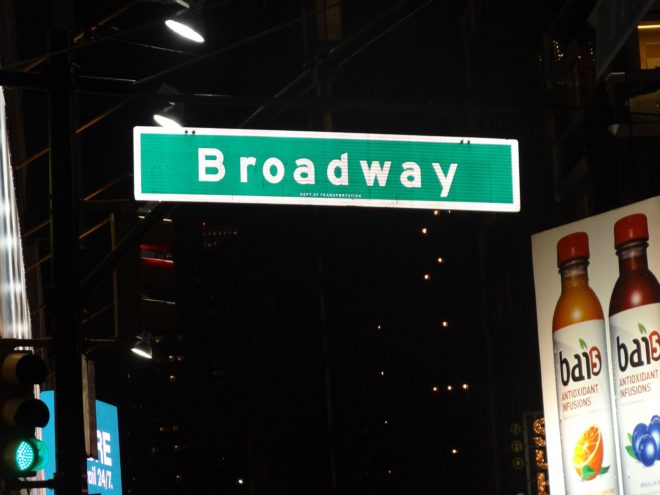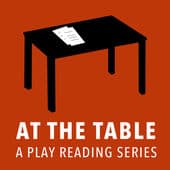Podcast Spotlight: At The Table


Put more simply, At The Table is a podcast where actors read through a script through several episodes. However, after the story is over, the actors and producers discuss the play, the script, and offer insights that laypeople outside the theater world rarely get a glimpse into.
Founded by theater veterans, Ned Donovan and Marcus Bagala, they have the unique expertise to make a podcast like this work. Besides their theater chops, Bagala is an experienced composer who’s worked extensively with This American Life and The Daily. Once the podcast idea was born, Rachel Flynn joined the team to create the podcast vision.
I was fortunate enough to get to meet the At The Table team and discuss the podcast, listener feedback, and why their podcast will appeal to people who might not consider themselves “theater people.” See below for our Q&A.
Listen: Apple Podcasts | Stitcher
Discover Pods: How did you decide to get into podcasting?
NED: Marcus has been involved in podcasting for a long time. When we founded Charging Moose Media together we wanted to have a podcast (and we’re developing more as well). We were chatting about what our specific skill sets and talent pool speaks to. We all have a theatre background and access to fantastic people on all spectrums of the New York theatre scene, plus there’s no podcast doing what we’re doing. So after having the idea we went immediately to Rachel to our join our team and be our Artistic Director. From there on, we hit the ground running.
MARCUS: Podcasting was sort of something that I VERY luckily fell into. A good buddy of mine, was the composer on the podcast Limetown (Martin Fowler) and I reached out to him just to ask his advice about getting involved in the podcast world. Marty ended up very graciously passing my name and along to Jonathan Menjiver at This American Life after hearing that they were looking for composers and I was off to the races. Since then my music has been on TAL pretty much on a weekly basis, as well as more closely collaborating with Ira Glass and Miki Meek on a couple of special episodes (most recently in December for the two part piece about Immigration in Albertville Alabama). I’ve also contributed music to the NY Times The Daily, am the head engineer for Fall of The House of Sunshine and a couple things that are coming up that I can’t quite talk about yet.
RACHEL: I sort of fell into podcasting when Ned and Marcus approached me about this project. My focus has always been in theater, a little bit and TV film, but mostly on stage work. But what I most love is new work for the stage. At the table allowed me to focus on new work a new riders in a completely new medium. So other than my love for More Perfect and Serial. I have to admit that this was my crash course in podcasting.
DP: How does At The Table differentiate from other theater-focused podcasts?
NED: As sort of mentioned above, we are the only podcast dedicated to full readings of new plays from emerging playwrights. We are definitely the only podcast producing them as full audio drama productions. Charging Moose Media is committing to telling great stories through New Media, and how better than to showcase fantastic new plays?
MARCUS: I think Ned sort of nailed it, I definitely don’t know of any other podcasts offering full audio productions of works meant for the stage. I would also add I think one of the fun things about how At The Table came about is that after the very initial idea that Ned pitched at me, we, (Ned, Rachel and I) all sat down and talked about what we’re all best at and the format of the show just kind of materialized from there. Rachel is bringing a really strong thoughtful perspective both in our programing, as a director (and her rocking connection in the theater community), Ned’s our major ideas guy (also with a strong theater background) and my technical experience in audio, as well as being a composer really all complimented each other perfectly.
RACHEL: There really doesn’t seem to be anybody else presenting brand new work for the stage in this format. We’ve talked many times on the show about the fact that one of the crucial but rarely talked about steps for developmental theater work is the living room table read: A group of actors getting together and trying these new words on the page for the playwright for the first time. No one makes any money at these things -they’re almost always in actual living rooms and usually you’re getting pizza or PBR as payment. As an actor and as a director I love these reading and I think that it’s unique and exciting to get to bring that sort of experience to our listeners. For the creators, one of the largest barriers of entry for developing new plats is money. It cost so much money even to do the most basic readings of new work, that, for a lot of writers, it just doesn’t happen. Believe it or not, even with pizza and PBR, it’s still an expensive endeavor. So I am thrilled that for a huge community of theater artists we’re providing a new format within which to learn about new work.
DP: How would you suggest non-theater folks get into the art?
NED: I think we have an appeal to a wide range of people. For lovers of audio dramas, this is a completely new addition to the form. For lovers of theatre, it gives access to plays that might have a hard time finding full productions. For places without a lot of theatre access, it allows audiences to hear some of the best actors in New York City perform works that very few, if any people have ever heard before. For lovers of storytelling, what better stories to hear than those crafted by amazing, soon-to-be discovered storytellers and writers?
MARCUS: I think thats the beauty of the show and our format, theres something for pretty much everyone. We’re just a podcast that presents beautifully written stories….and they change every month (because plays are contained works), so even if the thing from this month isn’t your vibe…maybe next month will be. If you’re someone who likes listening to interviews, we also do that to with the playwrights….and we don’t just talk about plays, we touch on current events, Hollywood, books etc.
RACHEL: We’ve got something for everyone! For writers, we talk so much about process. For actors and for lovers of theater, you get to see and hear folks approaching new work completely cold for the first time. Actors work completely differently in this scenario and it’s thrilling to hear. For folks who aren’t in theater, this is an audiobook! this is an interview! this is a set of podcasts about a brand new set of worlds and fandoms. It’s an incredibly exciting time to be in the theater community because our plays are about everything and everyone, or they should be. New work isn’t just for the highly experienced, highly trained, academic folks who have been creating new work for 150 years anymore. It’s about inclusion of experience and stories that haven’t yet been told. And we are so psyched to be a part of that. We think that it should be fun for everyone, even if this is your first foray into theater of any kind.
DP: How has listener feedback been?
NED: Feedback has been fantastic. It has been overwhelmingly positive, and the constructive feedback we’ve received has allowed us to refine the show so that it keeps getting better, episode by episode.
MARCUS: Ned said exactly what I was going to say.
RACHEL: We so dig that people seem to dig it. It’s exciting to us that it’s not just actors in New York listening to us on their days off. It’s been people from all over the world, and it’s been people who love the actors we’ve brought in. It’s for people who love table reads and for people who had no idea what a table read was before they sat down to listen to us.
DP: What’s your recording and editing schedule like?
NED: It has been an ever-changing beast, because all three of us are actively working in our fields, so we’ve tried many different systems. Recently we recorded two months worth of plays, and are working to get them edited and released so we can record more.
MARCUS: It really depends on the month, we record in different locations, different amount of actors and all sorts of other variables so there are always new challenges. But usually it’ll go something like, we record the play (hopefully with a nice long lead before our release date), Ned will edit down all the dialogue, shape the interviews and get everything cleaned up and labeled and then pass it my way (again hopefully with a lead so we’re not rushing) and then I’ll clean up any noise issues we might have, mix the dialogue and lay in music and sound design as needed. If we were doing this full time our turn around would be about a week or so, but because we’re all busy so it tends to get spread out over a month or so.
RACHEL: They answered this one perfectly. The only thing I would add is frequently it involves a lot of chaos… usually my fault. 🙂
DP: What’s the hardest challenge for you as an indie podcaster?
NED: The hardest part I think has been gaining traction with a wider audience. Finding an audience, figuring out how to best promote our show to them, and then retaining them is something we are getting better at day-by-day but is certainly a challenge.
MARCUS: Only thing I’d add to what Ned said is that i think we frequently struggle with finding time to get everything put together, we’ve all got a full slate most of the time so its always about finding those little moments where we can devout time to At The Table and keep the ship a float, that’d be a lot easier if we had a budget so I could bring in an assistant engineer or an administrative assistant…or whatever else.
RACHEL: The boys answered this one excellently.
DP: What podcasts do you listen to in your spare time?
NED: I am a pretty avid podcast listener. My favorite podcasts currently are Reply All and The Dollop. I also am subscribed to The Daily, 99% Invisible, The Moth, The Hilarious World of Depression, The Risk, My Dad Wrote a Porno, The Sporkful, Death Sex & Money, Invisibilia, Obscure Music History, Our Americana, Radiolab, Revisionist History, Song Exploder, Song Salad (which is a wonderful show but good friends and collaborators of ours), This American Life, The Story Behind, Ask Me Another, and Wait Wait Don’t Tell Me.
MARCUS: I don’t listen to much at this point because podcasts are a large part of my work right now, so I’m listening to podcasts 8-10 hours a day I’m not usually super inclined to go and listen to more…but when I do I usually check out the most recent This American Life and I’ve always been a fan of Reply All.
RACHEL: I have listened to More Perfect three times. Please do not tell Ned and Marcus that this is almost entirely what I have listened to. I should probably get into more podcasts. Next month?













Comments
Comments are closed.